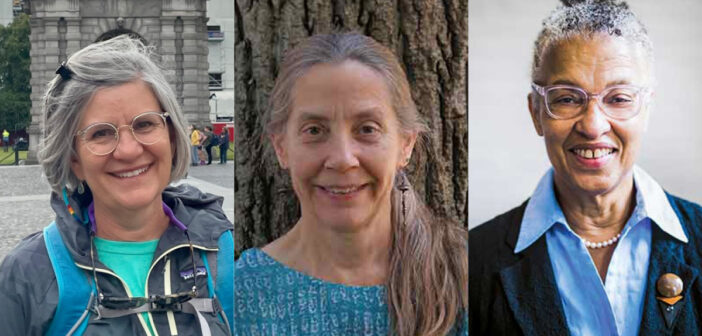Lehigh’s Ombuds Office is expanding to include a third ombudsperson, Kathleen Hutnik.
Hutnik is the associate deputy provost for graduate education and was recently named the newest ombudsperson, joining Anne Meltzer, professor of earth and environmental sciences, and Jennifer Swann, professor of biological sciences.
Meltzer said the office was established in 2002 with the goal to provide an informal, safe environment where members of the Lehigh community can have conversations about work environment issues, receive information on university policies or have mediated conversations. The office helps address issues ranging from institutional practices, peer-to-peer conflicts or professor-student conflicts.
In her deputy provost role, Hutnik said she helps graduate students work through challenges, uncertainties and obstacles. As an ombudsperson, she works with all Lehigh community members in a similar capacity.
Hutnik said the office felt they needed an ombudsperson who was a staff member to best understand issues involving Lehigh staff, as Swann and Meltzer are both faculty members.
Meltzer said they want all Lehigh community members to see the office as an accessible resource. They also want those seeking help to have a choice of who they are most comfortable working with.
As an office independent from the institution, Hutnik said the ombudspersons avoid conflicts of interest by not engaging in cases where they know the people involved. This principle helps encourage individuals to share sensitive information without fear of bias or breach of confidentiality.
Ombudspersons operate as a confidential resource as long as a case doesn’t include harm intended to oneself or another person, which ombudspersons are required to report.
“There’s no ability for someone to make an ombuds disclose what someone has said to them,” Meltzer said.
Meltzer said the ombuds are trained by the International Ombuds Association, formulating their service on the four pillars of informality, neutrality, confidentiality and independence.
Meltzer said the office is informal. They provide information and consultation to empower people to solve their problems by developing skill sets that can address conflicts.
For those who want to lodge a formal complaint or other formal processes, ombuds will help them find the resources necessary to take the next steps.
“We do have people that come and want us to just make it better,” Swann said. “That’s not our job. Our job is to give you tools. We’ll help you fix it and we can be mediators,” Swann said.
Hutnik said the office informs Lehigh’s administration about trends they notice so the university can decide if change is necessary.
Despite the benefits it provides, Swann said the office struggles with a lack of awareness surrounding its existence and available resources. Swann said offices at other schools may be met with hundreds of cases annually and have ombuds who meet with community members multiple times a week, yet she normally works on one case per month.
Hutnik said the ombuds are working to spread information clarifying their roles.
“We have met with the Graduate Student Senate and student life on campus, so the whole staff there recognizes we can be a resource for them and for students,” Meltzer said. The ombuds have met with Lehigh’s human resources and the Provost Office, as well.
However, Swann said these groups often forget about the office or do not use their resources because of the culture that surrounds avoiding conflict — she said dealing with conflict head on is necessary.
“Our goal is to increase communication between people in conflict so that they can figure out what the solution is,” Swann said. “That is hard because in this country…we don’t deal with conflict. When there is a conflict, we hope somebody else will come from somewhere else and fix it.”
Hutnik said it is rewarding to have someone walk away from a consultation feeling calmer, and she looks forward to doing it in this position.
“Even though, honestly, it’s the hardest thing I do, it’s (also) the most gratifying thing I do,” Hutnik said.






Comment policy
Comments posted to The Brown and White website are reviewed by a moderator before being approved. Incendiary speech or harassing language, including comments targeted at individuals, may be deemed unacceptable and not published. Spam and other soliciting will also be declined.
The Brown and White also reserves the right to not publish entirely anonymous comments.